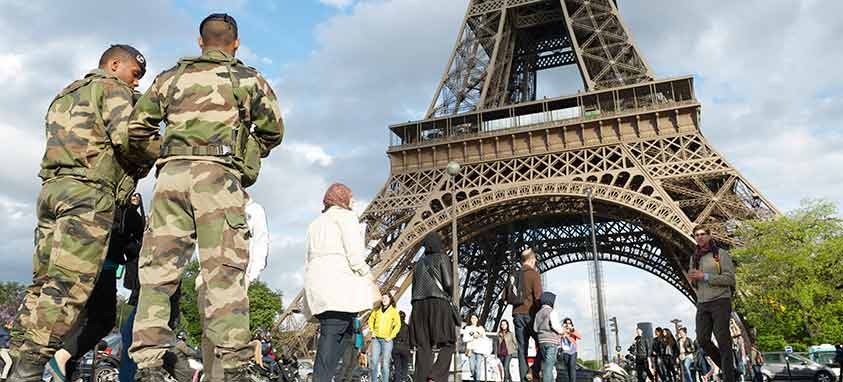This week, armed protesters took hold of a federal building in Oregon. The hostile situation has been identified as domestic terrorism, and continues a spate of violence that carries on from 2015. Last September, the Paris attacks involved a series of coordinated shootings that occurred in and around the city and made headlines around the world. While some believed that visits to the region would not be impacted, many more worried that business and leisure travel to France would dwindle.
In light of these world events which invariably affect travel, Travel Leaders Group has sought to determine the actual impacts to travel bookings in a survey conducted on traveler confidence domestically and abroad. Although the threat of terrorism knows no bounds, it found that most travelers are not prevented from visiting various countries.
“Today’s news headlines and 24/7 media coverage provide so much information that often leads consumers to question whether or not they should travel,” Ninan Chacko, CEO of Travel Leaders Group, said in a statement. “Thus the findings on the ‘confidence gap’ are gratifying, demonstrating that consumers ultimately employ rational thinking – along with counsel from their travel agent – when making key travel decisions.”
Data on traveler confidence was gathered from 1,087 responses made by travel agents based in the U.S., with at least half of their portfolios consisting of leisure travelers. Respondents were asked questions regarding canceled and delayed trips due to concerns of terrorism. A confidence gap between traveler confidence and the actual impact on bookings found Canada to be the most favorable destination—there was only a 3.5 percent difference between reported cancellations and delays and travel concerns. Approximately 96.1 percent of clients were slightly concerned about travel to Canada. The North American country ranked a little better than the United States, which received a 5.3 percent confidence gap.
Other global regions with favorable confidence gaps included:
-New Zealand—8.7 percent
-Australia—8.8 percent
-South Pacific—9.2 percent
-Northern Europe—21.7 percent
Regions with the least favorable confidence gaps were:
-The Middle East—61.8 percent
-Asia (excluding India and Southeast Asia)—55.6 percent
-Russia—47.4 percent
-Africa—45.1 percent
The top global regions where travel agents reported no cancellations or delays included:
-Canada—99.6 percent
-New Zealand—99 percent
-Australia—98.8 percent
-United States—98.5 percent
-South Pacific—97.5 percent
-Northern Europe—95.9 percent
-South America—94.5 percent
-Central America—94.1 percent
-Southern Europe—93.9 percent
-Western Europe—91.5 percent
-Asia (excluding India and Southeast Asia—91.1 percent
-Southeast Asia—91 percent
-India—91 percent
| No cancellations or delays | No concerns / only a little concerned | Confidence Gap | |
| Canada | 99.6% | 96.1% | 3.5% |
| United States | 98.5% | 93.2% | 5.3% |
| Mexico | 87.3% | 50.5% | 36.8% |
| Central America | 94.1% | 55.3% | 38.8% |
| South America | 94.5% | 56.3% | 38.2% |
| No cancellations or delays | No concerns / only a little concerned | Confidence Gap | |
| Western Europe | 91.5% | 69.8% | 21.7% |
| Eastern Europe | 87.8% | 55.0% | 32.7% |
| Northern Europe | 95.9% | 74.2% | 21.7% |
| Southern Europe | 93.9% | 69.7% | 24.2% |
| Russia | 84.1% | 36.7% | 47.4% |
| No cancellations or delays | No concerns / only a little concerned | Confidence Gap | |
| Africa | 81.7% | 36.6% | 45.1% |
| Asia | 91.1% | 35. 0% | 55.6% |
| Australia | 98.8% | 90.0% | 8.8% |
| India | 91.0% | 56.5% | 34.5% |
| Middle East | 74.0% | 12.2% | 61.8% |
| New Zealand | 99.0% | 90.3% | 8.7% |
| South Pacific(not Australia/NZ) | 97.5% | 88.3% | 9.2% |
| Southeast Asia | 91.0% | 61.9% | 29.1% |
Despite several ISIS threats and terror attacks that occurred in Europe last year, the region ranked in the top bracket of confidence gap percentages. Travel agents were also asked to examine their overall bookings to Europe and determine whether leisure and business travel had decreased. About half of travel agents surveyed stated that bookings to Europe in 2015 were higher than the year before, while 37.8 percent said bookings were on par with 2014. Only 12.7 percent said that trips to Europe had dropped.





